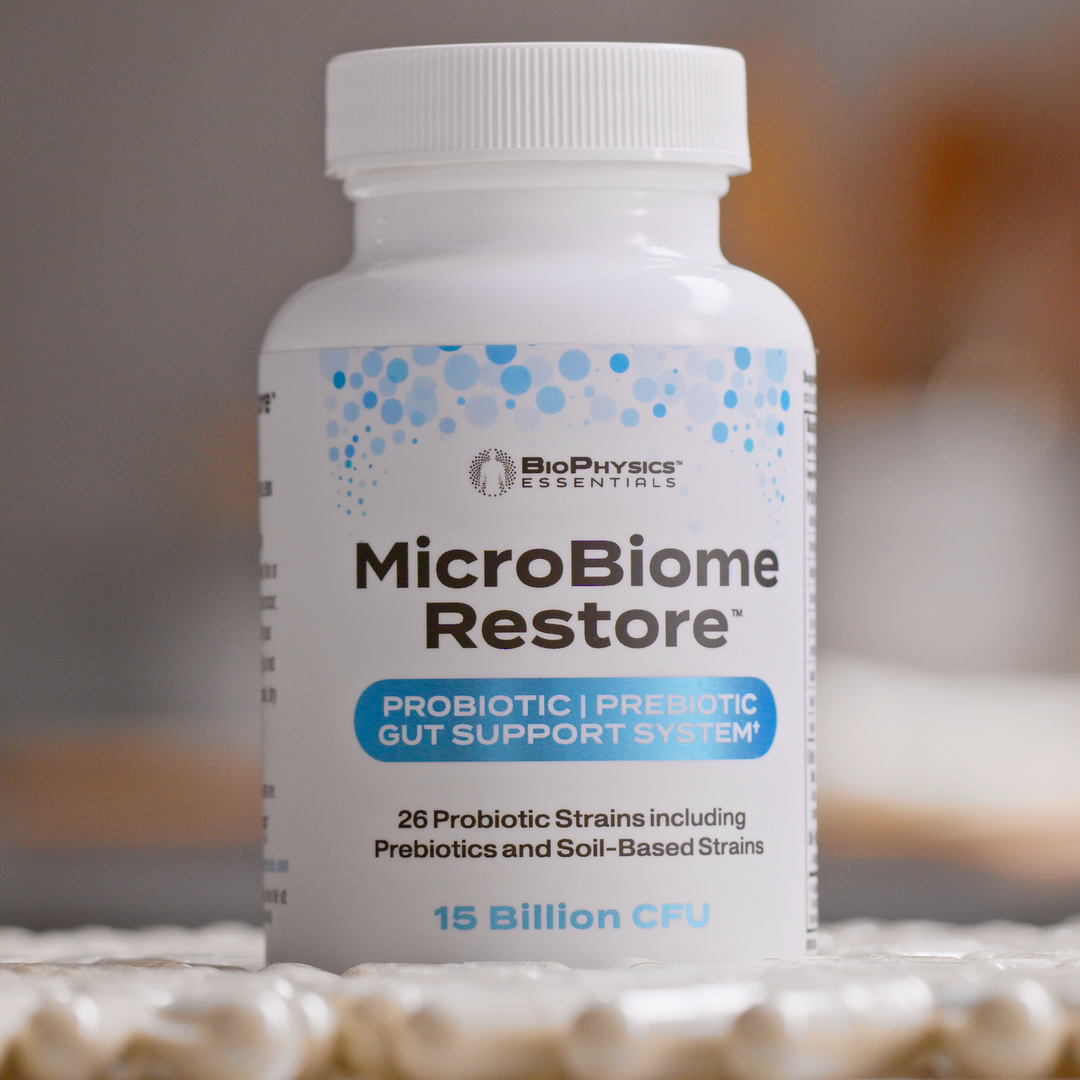Resistant starch is a special type of carbohydrate that's changing how we think about gut health. Unlike regular starch that our bodies quickly break down, resistant starch passes through our digestive system mostly intact. This makes it a strong prebiotic - food for the good bacteria in our gut. Let's explore the science behind resistant starch and why it's so important for our health, not just for digestion but for our whole body.
Key Takeaways
| Aspect | Details |
|---|---|
| Definition | A type of starch that resists digestion in the small intestine |
| Function | Acts as a prebiotic, feeding beneficial gut bacteria |
| Health Benefits | Improves gut health, regulates blood sugar, aids weight management, enhances mineral absorption |
| Sources | Unripe bananas, cooled potatoes, legumes, whole grains, green peas |
| Incorporation | Can be added to diet through foods or supplements |
What is Resistant Starch?
Resistant starch is a unique type of starch that resists digestion in the small intestine. Instead of being broken down into glucose like other carbohydrates, it travels intact to the large intestine where it becomes a primary food source for beneficial gut bacteria. This process of bacterial fermentation produces short-chain fatty acids, which have numerous health benefits ranging from improved digestive health to potential cancer prevention.
There are several types of resistant starch, each with its own unique properties and sources:
- RS1: Found in whole grains and seeds. This type is physically inaccessible to digestive enzymes due to its dense structure.
- RS2: Found in unripe bananas and raw potatoes. This type has a compact molecular structure that resists digestion.
- RS3: Formed when starchy foods are cooked and then cooled. This process, called retrogradation, changes the structure of the starch molecules.
- RS4: Chemically modified starch, often found in processed foods. This type is created through various chemical processes to resist digestion.
The Prebiotic Power of Resistant Starch
As a prebiotic, resistant starch plays a crucial role in maintaining a healthy gut microbiome. When it reaches the large intestine, our gut bacteria ferment it, producing short-chain fatty acids (SCFAs) like butyrate, acetate, and propionate. These SCFAs have numerous health benefits that extend far beyond gut health:
- They provide energy for the cells lining our colon, supporting the integrity of the gut barrier
- They help reduce inflammation in the gut and throughout the body, potentially lowering the risk of various chronic diseases
- They may improve insulin sensitivity, helping to regulate blood sugar levels and reduce the risk of type 2 diabetes
- They can help us feel full by stimulating the production of satiety hormones, potentially aiding in weight management
- They may have neuroprotective effects, potentially improving cognitive function and reducing the risk of neurodegenerative diseases
Premium prebiotics like resistant starch are worth considering for their powerful effects on gut health. They can help create an environment where beneficial bacteria thrive, potentially improving overall digestive health and wellbeing. The consistent consumption of resistant starch can lead to a more diverse and balanced gut microbiome, which is associated with better overall health and a reduced risk of various diseases.
Health Benefits of Resistant Starch
Research has shown that resistant starch may offer several significant health benefits, making it a valuable addition to any diet:
1. Improved Gut Health: By feeding beneficial bacteria, resistant starch helps maintain a diverse and healthy gut microbiome. This can lead to improved digestion, reduced inflammation, and a stronger gut barrier, which is crucial for overall health. A healthy gut microbiome has been linked to better immune function, improved mental health, and a reduced risk of various digestive disorders.
2. Better Blood Sugar Control: Resistant starch may help improve insulin sensitivity and reduce blood sugar spikes after meals. This is particularly beneficial for people with or at risk of type 2 diabetes. The slow fermentation of resistant starch in the gut leads to a gradual release of glucose into the bloodstream, helping to maintain stable blood sugar levels throughout the day.
3. Weight Management: The fermentation of resistant starch produces compounds that may help us feel full, potentially aiding in weight control. These compounds, particularly short-chain fatty acids, can influence hormones that regulate appetite and metabolism. Additionally, resistant starch provides fewer calories per gram compared to digestible starches, which can contribute to a lower overall calorie intake.
4. Enhanced Mineral Absorption: The fermentation process can make it easier for our bodies to absorb important minerals like calcium and iron. This is due to the slight acidification of the gut environment during fermentation, which can increase the solubility of these minerals. Improved mineral absorption can contribute to better bone health, stronger immune function, and overall improved nutrition.
Improved Gut Health
Feeds beneficial bacteria, maintaining a diverse and healthy gut microbiome
Blood Sugar Regulation
Improves insulin sensitivity and reduces blood sugar spikes after meals
Weight Management
Produces compounds that increase satiety, potentially aiding in weight control
Enhanced Mineral Absorption
Fermentation process improves absorption of minerals like calcium and iron
Natural Sources of Resistant Starch
Many foods naturally contain resistant starch or can develop it through cooking and cooling. Here are some excellent sources to consider incorporating into your diet:
- Unripe bananas: As bananas ripen, their resistant starch content decreases while their sugar content increases. Green or slightly underripe bananas are an excellent source of RS2.
- Cooked and cooled potatoes: The cooling process after cooking allows the starch molecules to reorganize into a more resistant form (RS3).
- Legumes like beans and lentils: These are rich in RS1 and maintain much of their resistant starch content even after cooking.
- Whole grains: Particularly high in RS1, whole grains like oats, barley, and wheat provide a good amount of resistant starch.
- Green peas: Fresh or frozen green peas are a good source of RS2.
- Cooked and cooled rice: Similar to potatoes, rice that has been cooked and then cooled forms RS3.
Cooking starchy foods and then cooling them (like in potato salad) can significantly increase their resistant starch content. This process, called retrogradation, changes the structure of the starch to make it more resistant to digestion. Interestingly, reheating these foods doesn't substantially decrease their resistant starch content, making meal prep an excellent way to incorporate more resistant starch into your diet.
Learning about natural sources of prebiotics can help you incorporate more resistant starch into your diet. By diversifying your intake of resistant starch-rich foods, you can support a healthier gut microbiome and potentially improve various aspects of your health.
Incorporating Resistant Starch into Your Diet
Adding resistant starch to your diet is not only easy but can also be delicious. Here are some practical tips and creative ideas to increase your intake:
- Add unripe banana slices to your morning cereal or smoothie. The slightly starchy flavor can add an interesting dimension to your breakfast.
- Enjoy a cold potato salad made with cooled, cooked potatoes. Experiment with different herbs and vinaigrettes to create a variety of flavors.
- Include more beans and lentils in your meals. Try making a large batch of bean soup or lentil curry and enjoy it throughout the week.
- Try overnight oats - the cooling process increases resistant starch. Add fruits, nuts, and seeds for extra nutrition and flavor.
- Cook rice ahead of time and cool it before eating. Use it in salads, stir-fries, or as a base for grain bowls.
- Experiment with green banana flour as a partial replacement for regular flour in baking recipes.
- Snack on raw oats or add them to yogurt for a crunchy texture boost.
It's important to introduce resistant starch gradually to avoid digestive discomfort. Start with small amounts and increase slowly over time. This allows your gut bacteria to adjust and helps minimize potential side effects like bloating or gas. Aim to include a variety of resistant starch sources in your diet to benefit from their different properties and nutritional profiles.
Resistant Starch Supplements
While whole foods are the best source of resistant starch, supplements are also available for those looking to boost their intake more consistently. MicroBiome Restore™ from BioPhysics Essentials is a product designed to support gut health, complementing the benefits of resistant starch in your diet. This supplement contains a blend of prebiotics and probiotics that work together to promote a healthy gut microbiome.
When choosing a supplement, look for products that are well-researched and from reputable sources. Consider factors such as the type of resistant starch used, the dosage, and any additional ingredients that may enhance its effectiveness. It's also important to look for products that have been third-party tested for purity and potency.
Always consult with a healthcare professional before starting any new supplement regimen, especially if you have existing health conditions or are taking medications. They can help you determine the right dosage and ensure that the supplement is appropriate for your individual needs.
The Role of Minerals in Gut Health
While resistant starch is crucial for gut health, minerals also play an important role in supporting our digestive system and overall health. They help maintain the proper pH balance in the gut, support enzyme function, and contribute to the structural integrity of the gut lining. Minerals can also enhance the effectiveness of prebiotics like resistant starch by providing the necessary cofactors for bacterial metabolism.
X-Cellerator™ Full Spectrum Minerals is a product designed to provide essential minerals that support gut health and overall wellness. It contains over 75 trace minerals that can help optimize your body's use of resistant starch and other nutrients. These minerals are derived from natural sources and are in a form that is easily absorbed by the body.
Some key minerals that support gut health include:
- Magnesium: Helps regulate muscle function in the digestive tract and supports enzyme activity.
- Zinc: Crucial for maintaining the integrity of the gut lining and supporting immune function in the gut.
- Selenium: An important antioxidant that helps protect the gut lining from oxidative stress.
- Iron: Necessary for the growth of beneficial gut bacteria.
- Calcium: Supports gut motility and can help bind to and remove harmful substances in the gut.
By ensuring adequate mineral intake alongside resistant starch consumption, you can create an optimal environment for your gut microbiome to thrive.
Conclusion: Embracing Resistant Starch for Gut Health
Resistant starch is truly nature's powerful prebiotic, offering many health benefits that go beyond just gut health. Its unique ability to feed our good gut bacteria and produce health-promoting compounds makes it a valuable addition to any diet. By adding more resistant starch-rich foods to your meals and considering high-quality supplements like those offered by BioPhysics Essentials, you can take a big step towards improving your gut health, enhancing your overall wellbeing, and potentially reducing your risk of various chronic diseases.
Remember, a healthy gut is the foundation of good health, influencing everything from our immune system to our mental health. By feeding your gut bacteria with resistant starch and supporting your digestive system with essential minerals, you're investing in your long-term health and vitality. Start small, be consistent, and listen to your body as you explore the benefits of resistant starch - nature's most powerful prebiotic. With time and patience, you may notice improvements in your digestion, energy levels, and overall health, showing the big impact that this simple dietary change can have on your wellbeing.














Share and get 15% off!
Simply share this product on one of the following social networks and you will unlock 15% off!